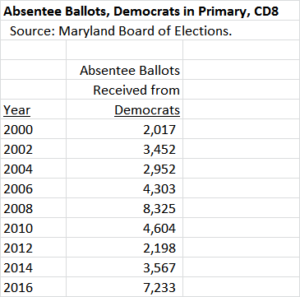By Adam Pagnucco.
Jonathan Shurberg kindly passed along a tip that absentee ballots are waaay up in CD8. He’s right, and that could have an impact on our congressional primary.
The state’s Board of Elections has released absentee ballot statistics by congressional district and party. CD8 has about one-eighth of the state’s population. But among Democrats, it has accounted for 27% of absentee ballots sent to voters and 25% of absentee ballots received by the state.

The Board of Elections also reports absentee ballots by state legislative district. Among Democrats, the five legislative districts from which the state received the most absentee ballots are all partially or entirely inside CD8. Legislative District 16, home to high turnout precincts in Bethesda and Chevy Chase, is the runaway leader. Legislative District 20, home base to Senator Jamie Raskin, ranked fifth.

Below are absentee ballots cast by Democrats in CD8 primaries from 2000 through 2016. The lead year for absentee voting was 2008, a record-breaking primary across the state which saw a contested election for President. This year’s primary is set to be at least number two on this measure. A caveat applies: CD8’s boundaries were significantly changed in 2012, as it lost many high turnout precincts in Potomac and gained many less-Democratic precincts in Frederick and Carroll Counties. Accounting for that fact, the absentee returns in 2008 and 2016 are in the same ballpark. Another thing: mailed absentee ballots with postmarks on or before election day will be accepted by the state through May 6, so more ballots will be received.

The competitive presidential primary between Hillary Clinton and Bernie Sanders is definitely responsible for part of this spike. Competitive presidential elections draw out voters like no other down-ballot offices do.
But we also hear that David Trone’s campaign has been running an aggressive absentee ballot program. This is part of Trone’s strategy to expand the electorate beyond regular Democratic voters. By mailing to registered Democrats who do not get mail from other candidates, saturating televisions, laptops, tablets and smartphones with ads and even advertising on Baltimore TV stations, Trone is betting that he can turn out voters who hear primarily or only from him. That’s his strategy for victory, and the absentee ballot performance may be a sign of it.
If Trone is deadlocked for the lead with another candidate at the end of tonight, don’t be surprised if the absentee ballots give him a win.
